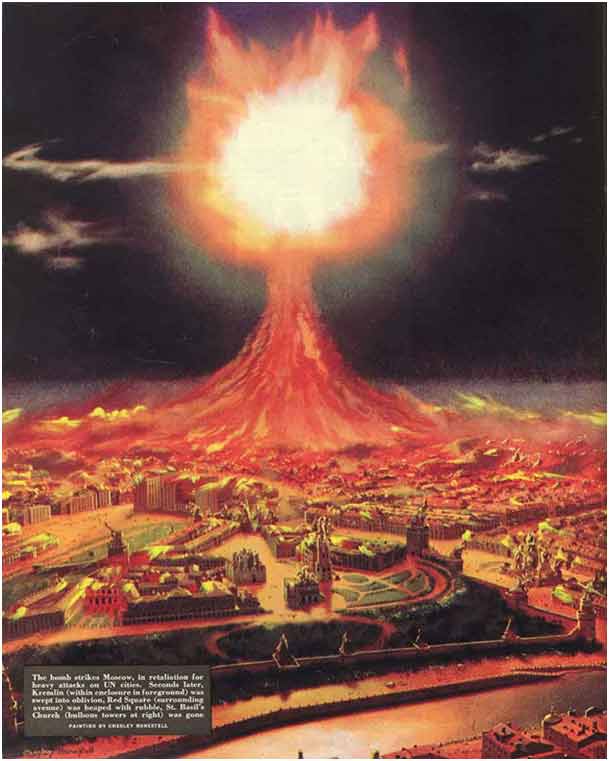Tactical Nuclear weapons and European security: Worrying developments
Nuclear attack on Moscow. US magazine Collier’s, 27 October 1951
As European States are surrounded in their geographical proximity by worsening geopolitical crises, worrying developments for European security related to nuclear weapons could just make things worse.
The terrorist threat
The presence of American tactical nuclear weapon stockpiles in some EU countries under NATO shared agreements (Belgium, Germany, Italy, and Netherlands) could become a growing problem for European security. These stocks can cause serious security crisis if terrorist would manage to enter these military facilities. Incidents happened already at the American military facility in Kleine Brogel in Belgium when some activists had been able to get into one of those sites[1].
Is there a real assessment of terrorist threats to those stockpiles at a time of worsening home grown terrorism with the potential support of enemy entities in the Middle East and North Africa region, especially after the Islamic State calls to organize terrorists attacks in European cities? Do European countries control the situation at these sites as they are under American or NATO control? European authorities should get better access to inspect theses bases in order to improve the transparency of the security regime.
Deterioration of mutual perceptions between European nations
If these NATO nuclear sharing agreements are prolonged in the future as it is still intended to do so, the cost of modernizing these weapons would also rocketing. They bring no value for European security as it reinforces the suspicion of Russia that these weapons brings even more unpredictability and add to the fragile equilibrium already at risk with the NATO missile shield project[2].
The German government prolonged these arrangements and made their future reduction depending on the negotiations between Russia and United States on nuclear arm reductions in Europe[3]. The Tornado planes able to carry a nuclear weapon should however be replaced gradually until 2025 by Eurofighter planes not able to carry nuclear weapons. As security perceptions deteriorate further in Europe, these plans might be changed for worse.
The limitation of nuclear actors
To keep the nuclear question a manageable one, it is important to limit the number of actors: the sovereign nuclear actors in Europe are France, United-Kingdom, Russia, and a non European State, the United States of America. These States are all members of the United Nations Security Council and they should stay the main actors in charge of these questions to keep nuclear questions on a dissuasive mode. They should refrain to fuel misperceptions as the geopolitical climate deteriorates since the Ukrainian question came to the top of European agenda in 2014.
The participation of Polish F16 to NATO conducting a nuclear strike exercise in Northern Italy[4], Steadfast Noon 2014, had a destabilizing effect on perceptions in Europe. It is believed to be the first time that Poland has participated with F-16s in a NATO nuclear strike exercise.
It was agreed in the 1997 NATO-Russia Founding Act Agreement that no nuclear facilities would be installed to former Warsaw pact members and now new NATO members. These exercises however create some doubts about these commitments.
The European sovereignty problem
The presence of NATO tactical nuclear weapons in Europe is mainly of symbolic nature and its aim is to reinforce the transatlantic relations. There isn’t any considerable reason in their presence in Europe because American, British and French nuclear capacities can ensure security.
In the end, the presence of American nuclear weapons under the sharing agreements is also blocking any political discussions on European security arrangements to achieve more European sovereignty. It is obvious that the president of the European Council, or even less likely, the president of the European Commission will never have the finger on a “European nuclear bomb”. It still might seem today as a utopia, but for future European sovereignty, negotiations between European States on extension of nuclear deterrence would be useful. They should be based on a Franco-German axis and aimed at building first a Franco-German nuclear security umbrella and extended progressively to other European nations. All past initiatives have failed so far in that matter, but to trigger a debate would at least force European actors to ask themselves the right questions and possibly progress on their own security taboos: European security should be managed by Europeans themselves.
Conclusion
Could Europeans resume talks over withdrawal American tactical nuclear weapons from Europe? Such an initiative could complement an overall global security treaty between European Union Member States and Russia, to achieve a security space from Vancouver to Vladivostok, as European nations are the obvious losers of any nuclear and military escalation on the Eurasian continent.
One precondition is to overcome the Ukrainian crisis. But contrary to what is usually stated, these European security negotiations leading to a new European Security Treaty at continental level might be the key to resolve the Ukrainian crisis which provokes new European fragmentation, and not the resolution first of the Ukrainian crisis as a condition to a continental reset.
[1] http://fas.org/blogs/security/2010/02/kleinebrogel2/
[2]http://www.spiegel.de/wissenschaft/technik/modernisierung-der-b61-atombombe-wird-immer-teurer-a-832886.html ; 16 May 2012, Markus Becker.
Discussions on the nuclear global zero proposals from the American president Barack Obama were de facto linked to the NATO missile shield project. It not only reinforced suspicion from Russia and China, but also created a Franco-German rift in NATO. The NATO missile shield project is then unnecessary and endangers European security as it reinforces the misperceptions between European States on nuclear deterrence equilibriums.
[3] http://www.atomwaffenfrei.de/presse/artikel/3412bbafe6be40ccf3e71d22880d7174/ohne-russische-zustimmung-kein-abzug-der-us-atomwaffen.html
The 2013 coalition treaty (CDU/CSU/SPD) specifies "Die Bundesregierung wird sich dafür einsetzen, dass zwischen den USA und Russland Verhandlungen zur verifizierbaren, vollständigen Abrüstung im substrategischen Bereich beginnen, und entsprechende Schritte beider Partner engagiert unterstützen. Erfolgreiche Abrüstungsgespräche schaffen die Voraussetzung für einen Abzug der in Deutschland und Europa stationierten taktischen Atomwaffen."
